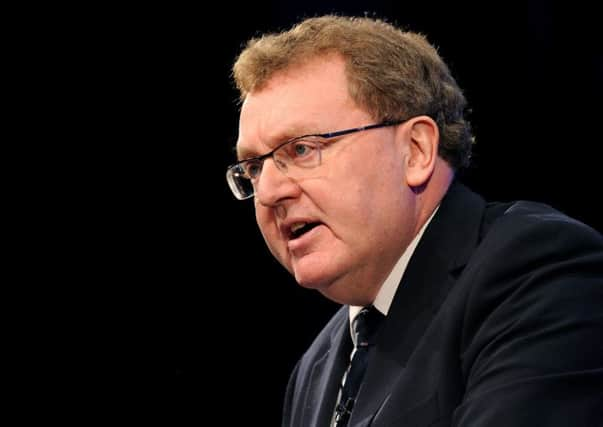David Mundell doesn’t rule out fresh devolution


Echoing the words of SNP First Minister Nicola Sturgeon, Mr Mundell promised that “it will not be business as usual” with the Scotland Office.
He acknowledged he has “a big job to do”.
However, on the crucial question of the bill to be tabled in the Queen’s Speech to devolve more powers to Scotland, Mr Mundell said that it would initially be the Smith Commission proposals.
Advertisement
Hide AdAdvertisement
Hide AdHowever, he hinted that the government was prepared to go beyond the devolution of some welfare, part of income tax and areas such as air passenger duty that are already included in the Smith Commission agreement, saying that he thought the government had a “very radical set of proposals to bring new powers to Scotland”.
His comments came as David Cameron finalised his top team ahead of tomorrow’s cabinet meeting which, including Mr Mundell, will have five Scots –Justice Secretary Michael Gove, Defence Secretary Michael Fallon, Work and Pensions Secretary Iain Duncan Smith and Welsh Secretary Stephen Crabb.
Mr Mundell’s appointment came despite demands from former first minister Alex Salmond, the new MP for Gordon, that the Scotland Office be abolished to save £7 million.
However, within minutes of leaving his meeting with the Prime Minister, Mr Mundell made it clear he wants a new approach from the Scotland Office where he served as a junior minister for the last five years.
Asked what he discussed with the Prime Minister, he said: “We have had a discussion about how we are going to shape the Scotland Office going forward. I can give the absolute guarantee it will not be business as usual.
“We will ensure the UK government in Scotland is effectively represented, that we take forward the Smith Commission proposals which will provide an opportunity for debate and discussion on the future of Scotland – and that is a debate in which I’m sure that all Scotland’s MPs will be playing a full part”.
Asked if his government was open to new ideas on top of the Smith Commission, he pointedly refused to rule out further powers and made it clear that the Smith agreement was a starting point.
He said: “In Parliament, when the Smith Commission proposals are put forward, they will provide an opportunity for debate and discussion. The government have a very radical set of proposals to bring new powers to Scotland and obviously my priority will be delivering them.”
Advertisement
Hide AdAdvertisement
Hide AdAsked if he was ruling anything out, he said the UK government would bring forward the Smith Commission proposals, adding: “And then, on the floor of the Commons, we will have debate and I expect MPs from Scotland to play a very full and active part in that debate.
“That is the way that it should be and it is the opportunity for MPs to make their views known in the usual way”.
The SNP argued the new tone underlined the changed political landscape in Scotland. SNP depute leader Stewart Hosie said: “At the time of the Smith Commission, the Tories, Labour and Lib Dems all said this was as far as more powers for Scotland could or would go.
“Less than six months later, and the decisive mandate of the people of Scotland for the SNP’s manifesto is already requiring change and progress for
Scotland.
“The powers we will prioritise are employment policy, including the minimum wage, welfare, business taxes, national insurance and equality policy – the powers we need to create jobs, grow revenues and lift people out of poverty.
“The Tories chalked up their worst ever share of the vote in Scotland last Thursday, and Labour and the Lib Dems were also reduced to a single seat.
“The days of business as usual are over, and the First Minister will be stressing that point to the Prime Minister when she meets him in due course.”
The appointments made by the Mr Cameron in his first majority government also suggest he wants to continue with major reform.
Advertisement
Hide AdAdvertisement
Hide AdA surprise move was the reappointment of Mr Duncan Smith as Work and Pensions Secretary to finish reforms to welfare and the introduction of the controversial universal benefit.
Meanwhile, Jeremy Hunt has survived as Health Secretary.
A third of the cabinet will be women, including the promoted Amber Rudd as Energy Secretary, at a time when the oil and gas sector is struggling because of the collapse in its value.
Sajid Javed has moved from culture to Business Secretary, replacing Lib Dem Vince Cable who lost his seat in the election.
John Whittingdale, the new Culture Secretary, is expected to bring in reforms to the BBC licence fee and charter.
Boris Johnson has been handed a role in Mr Cameron’s political cabinet but will not have a ministerial job while he remains mayor of London.